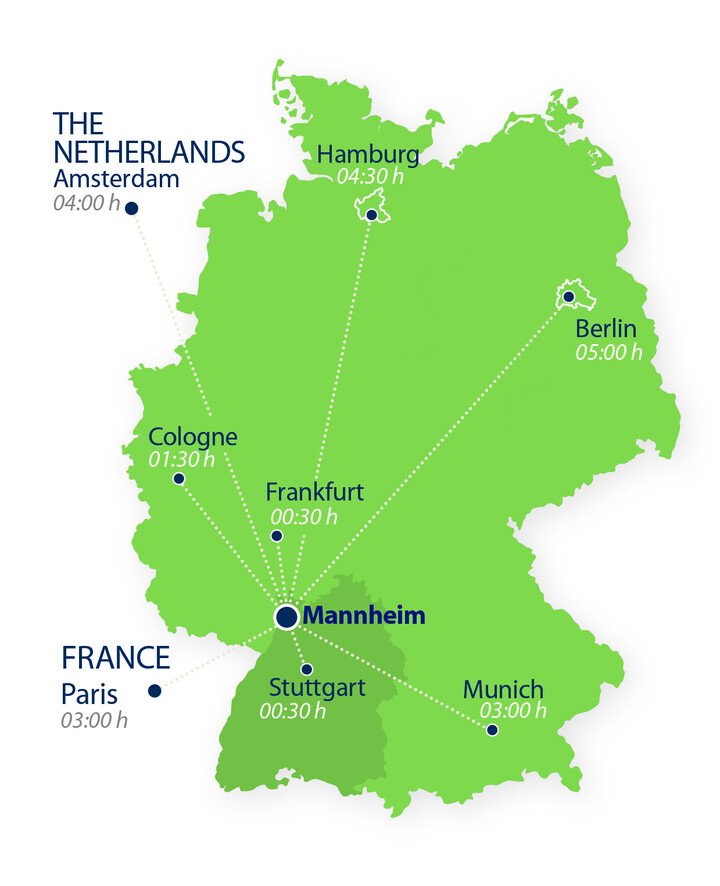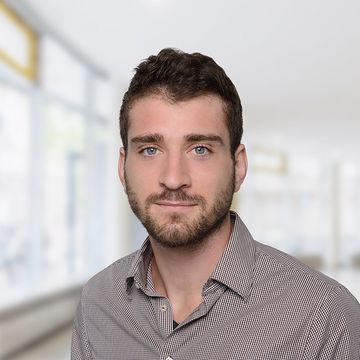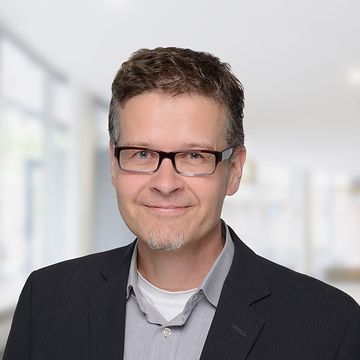Information for First-Year Students
Welcome to Mannheim!
We are very happy that you have decided to pursue the M.Sc. in Economics at the University of Mannheim. In order to help you orienting yourself, we have summarized some useful information about your first semester on this page. We wish you a successful start to your studies and hope you enjoy your time at our university!

Mannheim and the neighboring cities of Ludwigshafen and Heidelberg form the economic and cultural center of the Rhine-Neckar metropolitan region. The city lies on both the Rhine and Neckar rivers. You can reach Stuttgart and Frankfurt am Main in around 30 minutes with the high-speed ICE trains. Amsterdam, Berlin, Prague and other European capitals are also within reach.
Mannheim has a vibrant, young atmosphere with a variety of cultural facilities. Movie theaters, small theaters, bars, and clubs complete student life in the city. Next to its industrial charm, Mannheim has many green areas along its two rivers, and the palatine area, a wine region ideal for hiking, is at arm’s length.

Compared to other cities, the costs of living in Mannheim are relatively low, especially when it comes to the rental market. In addition to the city center (the Quadrate), the districts of Lindenhof, Schwetzinger Vorstadt, Neckarstadt, and Jungbusch are very popular. The Studierendenwerk can advise you on how to find a suitable place to live. The Studierendenwerk also manages modern student housing. For further information please visit the central website for prospective students.
Information on your first semester

We have summarized the most important information on your first semester in the M.Sc. Economics program. More information on enrollment, financial aid, the campus, etc. can be found on the central website for first-year students. If you have any questions, Mr. Sebastian Herdtweck will be happy to help you.
Introductory module in mathematics
In order to help you to get started, we offer E600 Mathematics, a preparatory math course, that we urge you to participate in. It will take place online and on-campus between 25 August and 3 September and will cover the vital mathematical concepts required by any graduate student in economics. The course is designed to help you with the core curriculum in microeconomics, macroeconomics and econometrics. Furthermore, this is a great opportunity to get to know your fellow students. For the first week of the course a digital option will be offered.
The script for the course can be downloaded here (the access information for the course website can be found in the welcome letter or be requested from the program manager). Please read chapter 0 prior to the beginning of the course. This introductory section deals with fundamental, overarching concepts that may be viewed as prerequisites for any mathematical application and study, regardless of its purpose or context.
First semester orientation events
Welcome sessions
The orientation session for master's students will take place on 1 September at 9:00 AM. Detailed information tba.
During the welcome session, you will learn more about the master’s program and the two week orientation phase, and find out all you need to know to successfully complete your first semester. Information on the different tracks will also be provided.
Orientation sessions (International Office)
Orientation Session for Degree-Seeking Students
When? tba
Where? tba
Welcome Reception for International Students
When? atba
Where? tba
Information session: exchange opportunities
Students interested in going abroad should attend one of the “Introductory Study Abroad Session” run by the International Office. The session will give you an overview of options for going abroad, the application process and funding programs. The dates can be found here.
An information session on the exchange opportunites in our M.Sc. Economics program will be offered in October. This session will provide more detailed information on the program-specific exchange programs, application procedure, and course recognition.
Introductory phase: core modules
Orientation phase
During the first weeks of the lecture period you can try out modules from the “Economics” or “Economic Research Preparatory Courses” module combinations before deciding which modules to take for the rest of the semester, and which track you want to pursue. By default, students will be registered for the module combination “Economics”. If you want to try out the module combination “Economic Research Preparatory Courses” please register for E700–703 through the course catalog of the CDSE program. For more information, see paragraph 2, subparagraph 3a of the examination regulations.
Module combination: Economics
If you choose to complete the module combination “Economics”, your first semester will comprise the following core courses:
Module combination: Economic Research Preparatory Courses
Application to the Economic Research track requires successful completion of the module combination “Economic Research Preparatory Courses” (doctoral level):
- E700 Mathematics for Economists
- E701 Advanced Microeconomics
- E702 Advanced Macroeconomics
- E703 Advanced Econometrics
The module descriptions can be found here. E700 Mathematics for Economists is a core, intensive module (consisting of lectures and exercise classes) which takes place throughout September. During the orientation phase, you can give it a go. If you are comfortable with the contents you may register for the examination which takes place at the beginning of October and, once passed, continue with E701–703. Otherwise, you may drop the course at any time prior to the exam registration and follow E601–603 fo the rest of the semester.
It is recommended that participating master's students still try to attend classes from the “Economics” module combination during the first weeks. According to experience, many students who successfully attended E700 and started with the subsequent modules (E701–703) decide to change to the “Economics” module combination at a later point in time. If you have the feeling that the “Economic Research Preparatory Courses” module combination is too challenging, you can switch to the “Economics” module combination until four weeks prior to the end of the lecture time (beginning of November).
Examinations
Depending on your track of study, you must take either three or four modules during the Introductory Phase.
Examination dates
Usually, examinations are taken during the examination period at the end of the semester (see our academic calendar for more details). Core modules may also include mid-term exams. If you are taking the module combination “Economic Research Preparatory Courses”, completion of module E700 Mathematics for Economists is mandatory in order for you to continue with the remaining modules of the Introductory Phase. Module E700 Mathematics for Economists is scheduled for the first four weeks of the semester, with the examination taking place in early October. The other modules in this combination begin once this examination has been taken.
Exam registration
You will automatically be registered for all module examinations that take place during the Introductory Phase. You cannot withdraw from these examinations.
Re-sit examinations
If you fail a module examination during the Introductory Phase, you will automatically be registered to retake it on the next available examination date (second attempt). A third attempt at an examination is only possible for one module during the Introductory Phase. If you fail a third attempt, or a second attempt of more than one module examination during this phase, you will be disenrolled from the master’s program in Economics. If you passed an examination but are unhappy with the grade, you may re-sit one examination of your choice during this phase. In such a case, you must register for the examination by contacting the Student Services office. The better of the two grades will then count towards your grade average.
Study and examination regulations
As a student, you should be aware of how your program is structured and the examination regulations that apply. You can find the full details here.
Student advisory service
Sebastian Herdtweck is the program manager and exchange coordinator. He is responsible for all organizational issues concerning the master's program and our exchange programs. Please contact him anytime (contact details below under “Contacts”) if you have any organizational questions, want to know more about exchange opportunities, or would like to give us some feedback. You are also welcome to drop by his office during his consultation hours.
Contacts
Administration

Sebastian Herdtweck (he/him)
Program Manager and Exchange Coordinator M.Sc. EconomicsUniversity of Mannheim
Department of Economics
L 7, 3–5 – Room 405
68161 MannheimConsultation hour(s):
Personal consultation hours: Tue and Wed, 9:30 – 11:30
Telephone availability: Tue and Wed, 9:30 – 16:30Dean of Graduate Studies

Prof. Dr. Henrik Orzen
Chair of Experimental EconomicsUniversity of Mannheim
Department of Economics
Professur für VWL, Experimentelle Wirtschaftsforschung
L7, 3–5 – Room 4.01
68161 MannheimPhone: +49 621 181-1890
Fax: +49 621 181-1893
E-mail: henrik.orzenuni-mannheim.de
Web: www.vwl.uni-mannheim.de/en/orzenConsultation hour(s):
Di 16–17 Uhr (nach Vereinbarung)